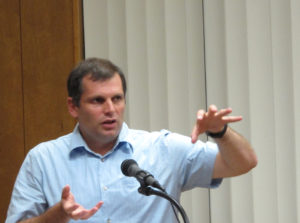
By Thomas C. Nash
Mirror-Spectator Staff
BELMONT, Mass. — Three professors gave their takes on the Nagorno Karabagh negotiations at a recent panel discussion at the National Association of Armenian Studies and Research (NAASR), with all agreeing the outcome may do more to weaken the republic than strengthen it.
The August 6 forum was designed to showcase their conclusions drawn from a July conference in Stepanakert, which Professors Levon Chorbajian, Asbed Kotchikian and Henry Theriault attended.
Theriault, an associate professor of philosophy at Worcester State College specializing in genocide and its denial, said that coming away from the conference in Stepanakert he had gained deeper insight into the challenges of a small nation facing a country used to getting its way.
“Armenia is facing a very powerful country,” Theriault said, referring to Turkey. “Opening the border is a real double-edged sword. There haven’t been enough studies to figure out what’s going to happen economically. It’s not clear what kind of industries will survive.”







